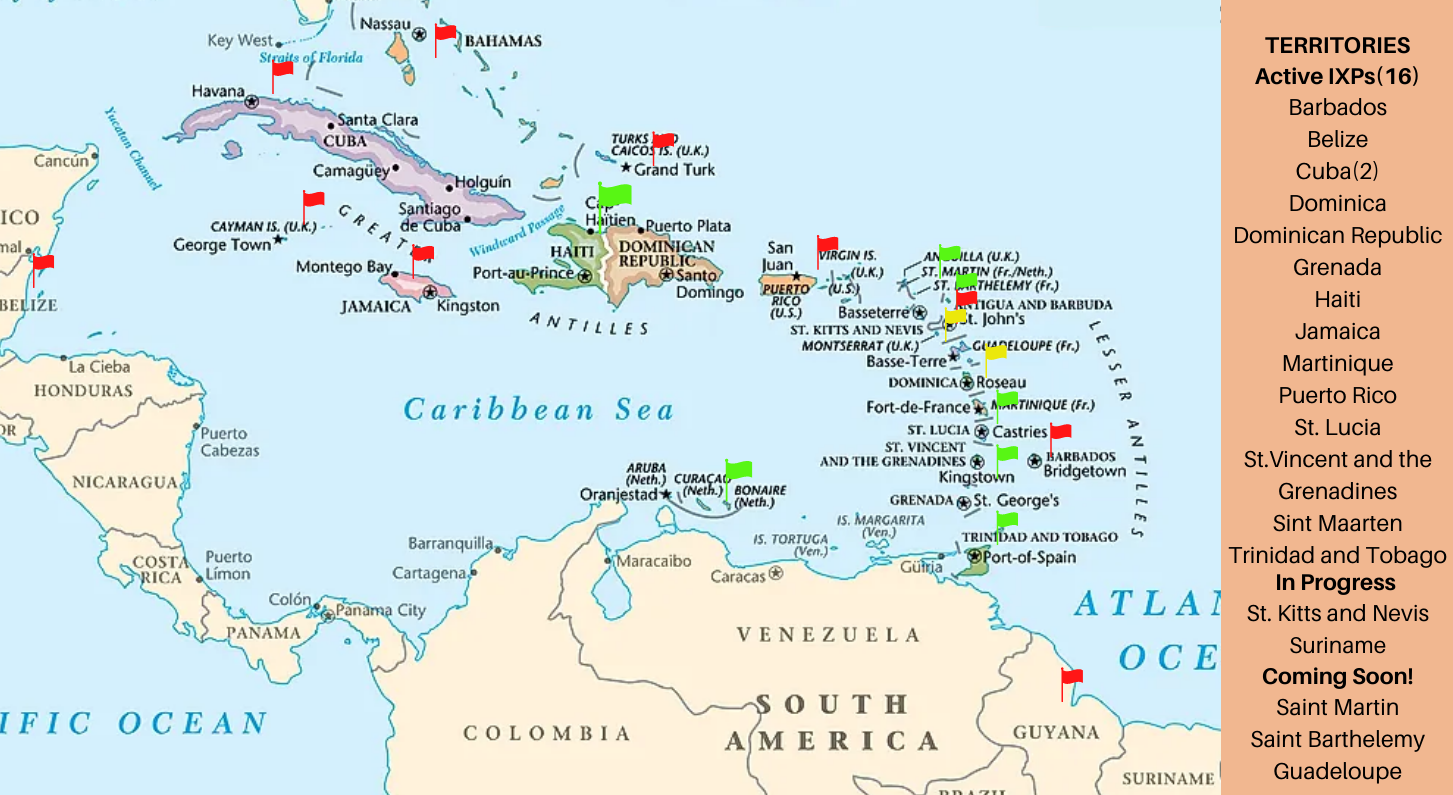Caribbean Internet Exchange Points
History of Caribbean Internet Exchange Points
The Caribbean Telecommunications Union’s (CTU) Internet Exchange Point (IXP) Proliferation Project had its genesis in 2006, when the CTU began promoting IXPs as critical Internet infrastructure in keeping with the provisions of the Caribbean Internet Governance Policy Framework. By 2009, the CTU had forged several strategic alliances with regional and international organisations to raise awareness, educate and advance IXP development in Member States. The CTU’s pioneering work in Internet Governance has since led to the establishment of 12 Internet Exchange Points in the Caribbean.
What Is an IXP?
Internet Exchange Points (IXPs) are the locations at which Internet Service Providers (ISPs) exchange traffic between their customers on a cost-neutral basis. Essentially all Internet traffic is ultimately derived from an IXP somewhere, though that location may be distant from the customers. Having a local IXP allows ISPs to interconnect directly, locally, at no cost, rather than by purchasing transit services from other ISPs who carry the traffic from more distant IXPs on their behalf.
Caribbean IXP Proliferation and Enhancement Project
Currently, most of the IXPs merely exchange traffic but some have progressed to hosting content and services. The CTU has now embarked on an initiative to strengthen and enhance the value of existing Caribbean IXPs and establish a new generation of IXPs to thereby catalyze entrepreneurial activity and the development of a Caribbean content industry. The CTU is of the view that the obstacles to the proliferation of strong and vibrant Caribbean IXP deployments can be overcome through collective and well-coordinated regional efforts.
Project Objectives
The primary objectives of the Caribbean IXP proliferation and enhancement project are to:
- Increase the proliferation of new IXP deployments and the effective functioning of existing IXPs to enhance regional traffic routing options in the Caribbean;
- Improve the resilience, capacity and efficiencies of Caribbean networks through enhanced routing infrastructure and services supported through enhanced regional collaboration and coordination;
- Enhance local and regional facilities for content delivery to improve user experience;
- Promote the social and economic benefits of IXPs among Caribbean Member States;
- Incentivise new regional Internet-based growth and development opportunities by strengthening the service support infrastructure at Caribbean IXPs.
Project Approach
Surveys will be utilised to establish baselines for our existing IXPs, followed-up by a combination of intervening discussions and focus group meetings, aimed at coordinating efforts to strengthen regional networking and collaboration among English and non-English speaking IXP Operators in the Caribbean. The findings and recommendations of our deliberations, would be utilised to stimulate local and regional entrepreneurship and inform supportive regional policy development. Policy proposals will be taken to the General Conference of Ministers for ratification and affirmative action as required.
Ultimate Outcomes
Network Optimisation and Resiliency – Utilising Caribbean IXPs to keep the physical path traversed by packets as short as possible, producing measurable improvements in service cost, performance, and efficiency and reducing latency Thus, providing the scalability to increase the network capacity available to domestic customers, while minimising corresponding capital or operational investment, especially in times of regional crisis that triggers upsurge in demand for capacity.
Content Industry Growth – Caribbean IXPs serving as the driver for growth of Internet-based entrepreneurship and national development opportunities. Specifically, driving the development of significant domestic content production, local hosting and co-location industry.
Human Resource Development – Caribbean IXP as a major contributor to the maturation of local network infrastructure and expertise in the Caribbean, providing a nucleus for the education and retention of the Internet-skilled labor force that the information and communications technology sector needs for sustainable growth and economic progress.


